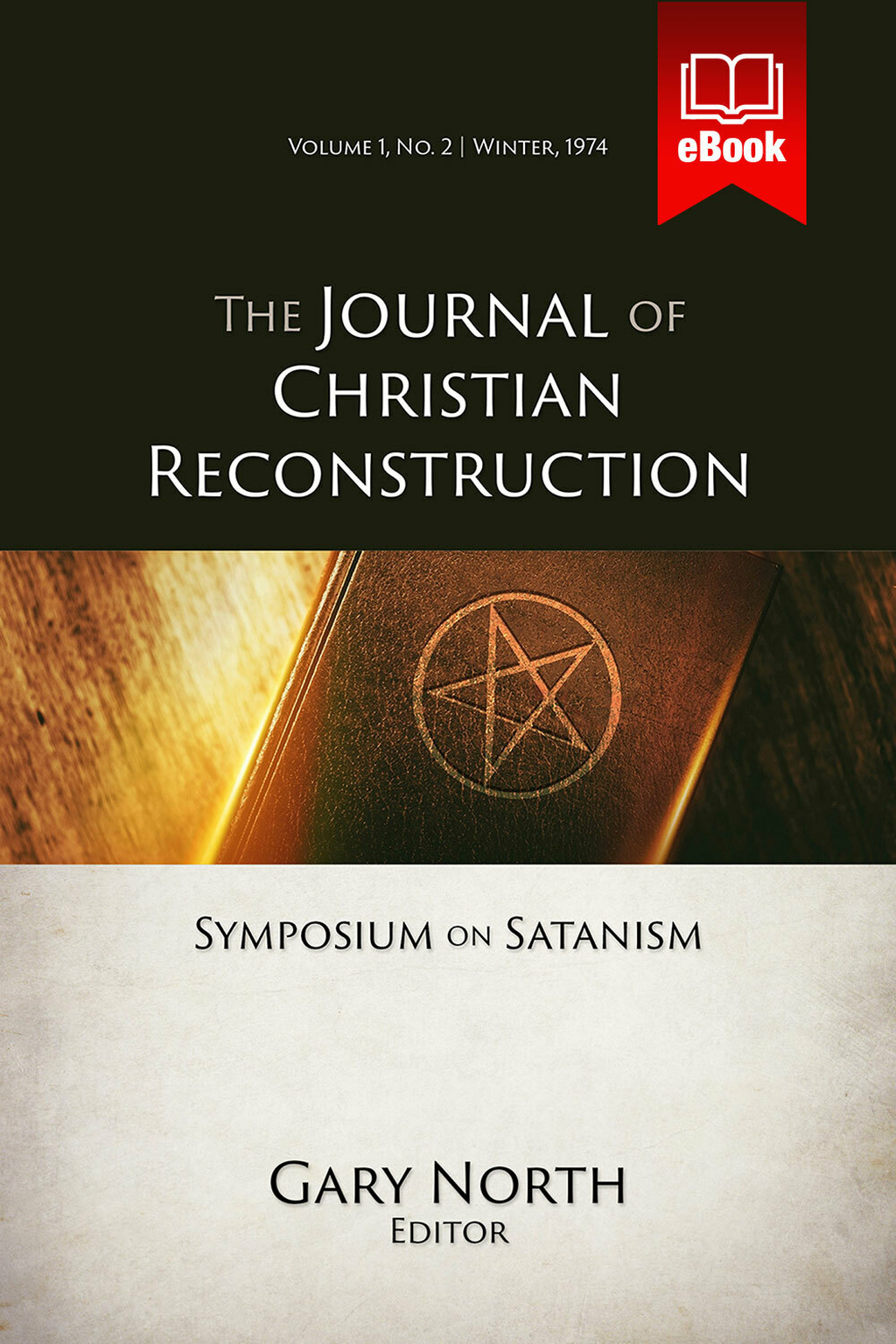
JCR Vol. 01 No. 02: Symposium on Satanism
Men cannot help but exercise dominion (Gen. 1:28); they will do so either in the name of the God of the Bible,or else they will seek to divinize some other force, whether “high” (the laws of nature) or “low” (demonic power).
eBook

- Greg L. Bahnsen
- , R. J. Rushdoony
- View More Authors
- F. Seth Dyrness
- David R. Ketchen
- Diana Lynn Walzel
- Mark Wyndham
- Thomas Molnar
- Jean C. Blasdale
- Gary North
Winter 1974
Witchcraft, occultism, paranormal science, and mysticism are growing like plagues in the Western world. These phenomena have baffled modern educators and conventional rationalists, since such activities seem to be completely opposed to everything that the public schools have taught for over a hundred years. Worst of all in the minds of conventional secularists, all this discussion of demonic forces may lead to an even more appalling conclusion: the idea that God, also a supernatural force, may reappear in the modern, "post-Christian" world. At all costs, a God who can make himself felt in time and on earth must be avoided. Mysticism is one thing—totally internalized—but supernatural forces are not supposed to have any impact on external, so-called phenomenal affairs.
Occultism is another form of humanism. It is the product of the quest for power apart from God and His law-order. It was not a major force in the so-called "Dark Ages." Not until the fifteenth century did witchcraft become a serious problem in Europe, and it was the Renaissance, not medievalism, which sparked the great explosion of demonism and magic in the sixteenth century. During the period of the early Middle Ages (A.D. 500-1000), there were practically no signs of witchcraft in Europe. Only with the revival of ancient Gnosticism and the invasion of Middle Eastern dualism did signs of widespread witchcraft reappear. Occultism and humanism are not sworn enemies; they are first cousins. It was only the influence of Christian principles, which laid such stress on the orderliness of God's universe, that made possible the confidence of modern rationalists in denying the influence of supernatural forces. As the confidence in creation-law has waned in this century, "rational" humanism has become increasingly unsuccessful in retarding the expansion of occult humanism.
This Journal of Christian Reconstruction offers readers the necessary evidence for a refutation of the familiar charge that occultism and religion necessarily go together, and that only a hard-headed rationalism can restrain the forces of spiritual anarchy. Far from retarding occultism, modern rationalism's blindness to the reality of occult forces is now creating a perverse inquisitiveness on the part of modernism's children, who have learned to be critical of everything, including old-fashioned rationalism. The philosophy of the "open universe"—closed to God—has produced the new occult experimentalism. If anything except Christian orthodoxy might be true, why not find out through personal observation and experiment? Since 1965, the Western world has faced the greatest explosion of occultism that it has seen in three hundred years. This time no one can blame orthodox Christianity: it has been the secularists who have wielded the power.
- Greg L. Bahnsen
Greg L. Bahnsen, (1948-1995), was an ordained minister in the Orthodox Presbyterian Church and a full time Scholar in Residence for the Southern California Center for Christian Studies where he taught Apologetics from a distinctly Reformed perspective.
Bahnsen was a pillar of the Christian Reconstruction movement begun by Rousas John Rushdoony and wrote and spoke frequently for Chalcedon in the 1970’s. Bahnsen was a leading proponent of theonomy, postmillennialism, and presuppositional apologetics. His 1985 debate with atheist scholar, the late Gordon Stein, was dubbed The Great Debate, and remains a classic as well as a benchmark in Christian apologetics.
His early death came as a result of complications following his third heart surgery in December of 1995.

- R. J. Rushdoony
Rev. R.J. Rushdoony (1916–2001), was a leading theologian, church/state expert, and author of numerous works on the application of Biblical law to society. He started the Chalcedon Foundation in 1965. His Institutes of Biblical Law (1973) began the contemporary theonomy movement which posits the validity of Biblical law as God’s standard of obedience for all. He therefore saw God’s law as the basis of the modern Christian response to the cultural decline, one he attributed to the church’s false view of God’s law being opposed to His grace. This broad Christian response he described as “Christian Reconstruction.” He is credited with igniting the modern Christian school and homeschooling movements in the mid to late 20th century. He also traveled extensively lecturing and serving as an expert witness in numerous court cases regarding religious liberty. Many ministry and educational efforts that continue today, took their philosophical and Biblical roots from his lectures and books.
- F. Seth Dyrness
- David R. Ketchen
- Diana Lynn Walzel
- Mark Wyndham
- Thomas Molnar
- Jean C. Blasdale
- Gary North
Dr. Gary North (1942-2022), served as the editor of the Journal of Christian Reconstruction from 1974-81. He is the noted author of scores of articles and over thirty books on economics and history. He served as editor for GaryNorth.com and The Tea Party Economist and was the Director of Curriculum Development for the Ron Paul Curriculum.